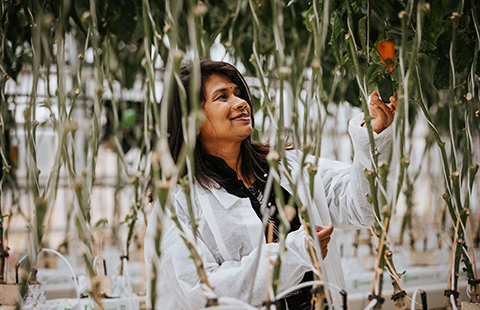
A new online film series produced by the BBC is putting the spotlight on ground-breaking research by Western Sydney University that is revolutionising the future of food production.
'Unlocking Science' is a series of short films, articles and podcasts produced for the International Science Council by BBC Storyworks, which shares innovative, accessible stories about scientists from around the world and their collaborative efforts to address inequalities and create a more sustainable future.
One of the films, 'Is the future of farming indoors?', features Western Sydney University's state-of-the-art greenhouse – part of the National Vegetable Protected Cropping Centre (NVPCC) at the Hawkesbury campus and a partnership between the University and Hort Innovation Australia.
It highlights the pioneering work of researchers from the University's Hawkesbury Institute for the Environment (HIE), who are utilising the technological advances being made in protected cropping to help feed the world's population.
Working together with institutions in different agro-climatic zones in India, Dr Nisha Rakhesh from HIE is helping develop collaborative research programs to support the farming industry as it grapples with challenges such as climate change and food security.
"Protected cropping is all about creating long-term sustainability for the global agricultural industry – vital if we are to feed the world's rapidly-growing population," said Dr Rakhesh.
"It creates the optimal growing environment and maximises crop yields by controlling everything from light and temperature to pollination and pests. We can multiply crop production by five times using just one-tenth of the input, and this gives us enormous potential for large-scale implementation by industry."
Importantly, the research outcomes from the National Vegetable Protected Cropping Centre are empowering future researchers and innovators in India through the University's agri-entrepreneurship program.
Working collaborating with multiple institutions in India, it is focused on upskilling the next generation, particularly young women, who are researching new solutions for growing crops like highly-prized saffron and that can be harnessed first and foremost by their local communities.
"Our work in India involves working with students, particularly women, and supporting their passion for agricultural entrepreneurship and higher degree research in related fields. These students are harnessing protected cropping technologies to provide a solution locally which can be trialed and tested on a small scale, and then ultimately scaled up and implemented in bigger markets," said Dr Rakhesh.
"It is inspiring to know that the long-term future of farming and agriculture in India and other countries is firmly in the hands of the next generation. They are utilising their fresh ways of thinking to chart a more sustainable path both locally and globally in the face of unprecedented climate challenges. I have no doubt they are more than ready to tackle these challenges head-on, and design innovative agriculture solutions that benefit us all."






